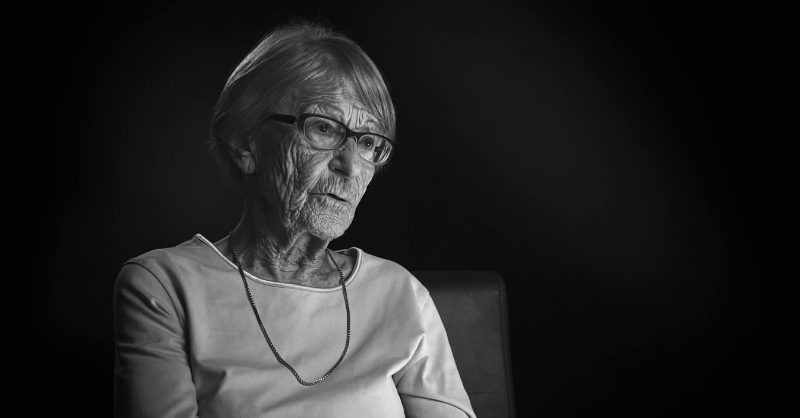Brunhilde Pomsel is the subject of a new documentary called A German Life. She was a secretary in Joseph Goebbel’s propaganda office along with five others. Now, at 105, she is telling her side of the story.
“It was rare for us to see him in the mornings,” she recalled. “He’d walk up the steps from his little palace near the Brandenburg Gate on to which his huge propaganda ministry was attached. He’d trip up the steps like a little duke, through his library into his beautiful office on Unter den Linden.”
She remembers the elegant furniture and the carefree environment of the ante-chamber that the secretaries sat in off of his main office.
“We always knew once he had arrived, but we didn’t normally see him until he left his office, coming through a door that led directly into our room. Sometimes, his children came to visit and were so excited to visit Daddy at his work. They were very polite and would curtsy and shake our hands.”
After recently losing her sign, Pomsel is relieved that her life is coming to an end. “In the little time that’s left to me – and I hope it will be months rather than years – I just cling to the hope that the world doesn’t turn upside down again as it did then.” She expresses relief that she doesn’t have any children to worry about.
She is adamant that she is not telling her story now in an attempt to clear her conscience. Although admitting to working in the German propaganda office and handling such jobs as understating the number of German casualties or increasing the number of times German women were raped by Soviet soldiers, she considers it “just another job.”
“Those people nowadays who say they would have stood up against the Nazis… believe me, most of them wouldn’t have.” She said that with the rise of the Nazi regime, Germany “was as if under a kind of a spell.”
Once, she was handed the case file for Sophie Scholl, a student known for her involvement in the White Rose resistance movement. “I was told by one of Goebbels’ special advisers to put it in the safe, and not to look at it. So I didn’t, and was quite pleased with myself that he trusted me.”
She considers herself a result of Prussian discipline. Her father would beat the children with a rug beater if they disobeyed. “That stayed with me, that Prussian something, that sense of duty.”
When she was 31, she worked for the state broadcaster as a secretary. She got the position after becoming a paid member of the Nazi party and receiving a recommendation for transfer to job in the ministry of propaganda. “I was flattered because it was a reward for being the fastest typist at the radio station.”
She remembered how her payslip listed a raft of tax-free allowances alongside her 275 Reichsmark salary, far more than what her friends were earning.
Pomsel noticed how difficult life became for her Jewish friend, Eva Löwenthal, after Adolf Hitler was in power. She also remembers being surprised when a popular radio announcer was sent to a concentration camp for being gay. Still, she claims to have largely lived in a bubble and was not aware of all of the damage the Nazi party was doing despite literally being at the heart of it all.
“I know no one ever believes us nowadays – everyone thinks we knew everything. We knew nothing, it was all kept well secret.”
She denies being naive for believing the official Nazi line – that Jews who disappeared had been sent off to villages in the recently annexed Sudetenland as part of a repopulation effort. “We believed it – we swallowed it – it seemed entirely plausible,” she says.
After the apartment that she shared with her parents was destroyed by an Allied bombing raid. Goebbels’ wife, Magda, gave her a silk-lined wool suit to cheer her up. “I’ve never possessed anything as chic as that before or since,” she said. “They were both very nice to me.”
She also expressed admiration for Goebbels himself, and recalls how he was well-dressed, well-groomed and always of a “gentlemanly countenance.” She describes the Goebbels she knew in the office as a far cry from the “ranting, rowdy man” he was during his public appearances.
In 1945, Brunhilde Pomsel’s world came crashing down around her. On the 30th of April, Hitler killed himself. The next day, Goebbels, his wife, and their children all followed suit. The Third Reich crumbled as Russian soldiers pushed into Berlin. Pomsel admitted to the invaders that she had served as a typist in the propaganda ministry and was sentenced to five years of imprisonment, which she spent in several of the various Russian camps prison camps around Berlin.
Upon her release, she took another job at the German state broadcaster, eventually becoming the executive secretary to one of the directors. The position was well paid and Pomsel lived a comfortable life.
It was only in 2005 that she endeavored to find out what happened to Eva, her Jewish friend. Traveling to the recently opened Holocaust Memorial, she discovered from the records that Eva had been taken to Auschwitz death camp in 1943 and declared dead in 1945.
